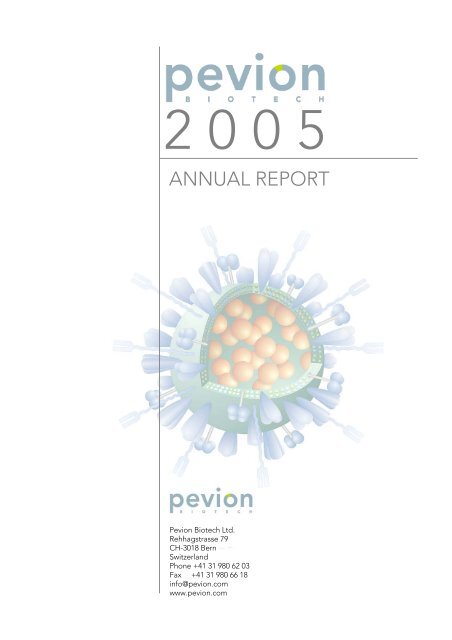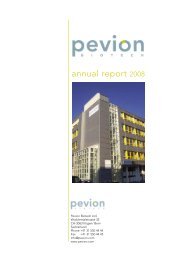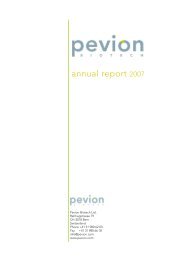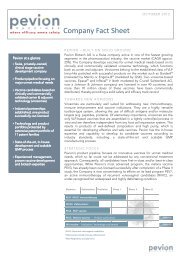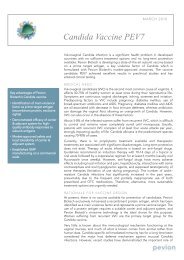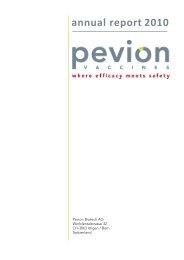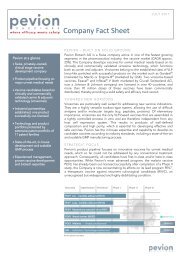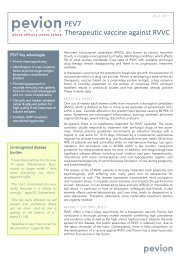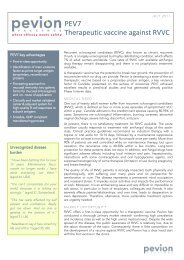ANNUAL REPORT - Pevion Biotech AG
ANNUAL REPORT - Pevion Biotech AG
ANNUAL REPORT - Pevion Biotech AG
You also want an ePaper? Increase the reach of your titles
YUMPU automatically turns print PDFs into web optimized ePapers that Google loves.
2005<br />
<strong>ANNUAL</strong> <strong>REPORT</strong><br />
<strong>Pevion</strong> <strong>Biotech</strong> Ltd.<br />
Rehhagstrasse 79<br />
CH-3018 Bern<br />
Switzerland<br />
Phone +41 31 980 62 03<br />
Fax +41 31 980 66 18<br />
info@pevion.com<br />
www.pevion.com
INDEX<br />
LETTER FROM THE CEO ......................................................................................3<br />
HIGHLIGHTS IN 2005 ............................................................................................4<br />
COMPANY PROFILE .............................................................................................5<br />
PRODUCT DEVELOPMENT..................................................................................6<br />
LEAD PROJECTS ...................................................................................................9<br />
<strong>Pevion</strong> <strong>Biotech</strong>_Annual Report2005_01_01_04_004 2/13
LETTER FROM THE CEO<br />
2005 <strong>ANNUAL</strong> <strong>REPORT</strong><br />
Dear Shareholder<br />
Vaccines are one of the fastest growing market segments in the healthcare<br />
industry. Especially therapeutic and cancer vaccines contribute to this<br />
market growth. Currently, there are anti-cancer products based on passive<br />
immunization with antibodies on the market. However, this type of vaccines<br />
requires an expensive production process that leads to high prices on the<br />
market. In the future, these treatments will be joined by more economical<br />
vaccines based on tumor antigens. <strong>Pevion</strong> <strong>Biotech</strong>’s validated technology<br />
and development process according to industrial standards enabled us to<br />
start the product development of cancer vaccines in early 2005. Due to an<br />
accelerated development process <strong>Pevion</strong> <strong>Biotech</strong> was able to reformulate a<br />
very promising breast cancer antigen according to GMP standards in a short<br />
period of time. The product candidate, which is developed in cooperation<br />
with Bio Life Science in Vienna, is scheduled to enter the phase I clinical<br />
study in Q2 2006.<br />
In 2005 <strong>Pevion</strong> <strong>Biotech</strong> also reached important milestones in the field of<br />
prevention and therapy of infectious diseases. The malaria vaccine candidate<br />
entered clinical phase II, and in addition the HCV vaccine candidate is ready<br />
to enter clinical phase I in Q3 2006.<br />
In 2005 the company followed its aggressive patent strategy and submitted<br />
2 technology and product patents respectively.<br />
With regard to the life cycle management of the virosome technology,<br />
<strong>Pevion</strong> <strong>Biotech</strong> established a new process for the production of fully<br />
functional lyophilized virosomes. This process improved the stability<br />
characteristics of virosome vaccines and furthermore boosted doctor<br />
compliance. Lyophilized virosome products can be stored even at room<br />
temperature, overcoming common stability issues known for most vaccines.<br />
After reconstitution, the lyophilized virosome formulated vaccine is still fully<br />
active. The lyophilization process will bring us one step further towards the<br />
creation of high potential and premium virosome vaccines.<br />
As a matter of fact, <strong>Pevion</strong> <strong>Biotech</strong>’s key strengths predominantly lie in<br />
market-approved virosome technology, which benefits from strong patent<br />
protection. The industrial experience and the broad applicability of this<br />
carrier enable an accelerated product development process. Together with<br />
their excellent safety profile, which also includes broad market experience<br />
with children, the elderly and immune-suppressed persons, the resulting<br />
vaccines will be a competitive advantage in the market. In 2006, our<br />
company will further strengthen its product pipeline and will be well<br />
positioned on the way to create considerable added value in 2006.<br />
Sincerely,<br />
Peter Klein<br />
CEO <strong>Pevion</strong> <strong>Biotech</strong> <strong>AG</strong><br />
<strong>Pevion</strong> <strong>Biotech</strong>_Annual Report2005_01_01_04_004 3/13
HIGHLIGHTS IN 2005<br />
2005 <strong>ANNUAL</strong> <strong>REPORT</strong><br />
� Important steps forward in clinical development<br />
<strong>Pevion</strong> <strong>Biotech</strong>’s lead product, a multi-component malaria vaccine<br />
candidate, entered clinical Phase II. Positive interim results concerning<br />
immunogenicity and safety were announced in December 2005.<br />
� Achievements in product development<br />
In 2005 two projects reached preclinical status and are ready to enter a<br />
clinical phase I trial. One project aims for the development of a breast<br />
cancer vaccine, a collaboration with Bio Life Science, Vienna, and another<br />
project involves the HCV therapeutic vaccine candidate, representing <strong>Pevion</strong><br />
<strong>Biotech</strong>’s approach for a multi-epitope and personalized therapeutic<br />
regimen.<br />
� New vaccine candidate in the pipeline<br />
To strengthen <strong>Pevion</strong> <strong>Biotech</strong>’s pipeline, a diphtheria/tetanus vaccine was<br />
integrated into <strong>Pevion</strong> <strong>Biotech</strong>’s development plan. The vaccine candidate<br />
will be a premium booster vaccine for adults and have a considerably higher<br />
safety profile than conventional applications currently available in the<br />
market.<br />
� Increased stability for virosome vaccines<br />
In 2005 a new virosome-manufacturing process called lyophilization was<br />
established. This process is a groundbreaking innovation for virosome<br />
technology. It improves the stability and the formulation of pharmaceutically<br />
active substances.<br />
� GMP certificate for manufacturing<br />
<strong>Pevion</strong> <strong>Biotech</strong>’s quality system was approved by the national registration<br />
authority Swissmedic, and the certificate of GMP Compliance of a<br />
manufacturer was issued. It certifies that <strong>Pevion</strong> <strong>Biotech</strong> is authorized to<br />
manufacture up to Phase III clinical trial products in collaboration with Berna<br />
Crucell.<br />
� Newly established strategic collaborations<br />
<strong>Pevion</strong> <strong>Biotech</strong>’s virosome carrier/adjuvant technology platform provided<br />
the basis for a number of strategic alliances with international biotechnology<br />
companies, including Innogenetics (INNX; Ghent Belgium) and Mymetics<br />
(MYMX; NYC, NY).<br />
Additionally, <strong>Pevion</strong> <strong>Biotech</strong> signed an option agreement for an exclusive<br />
license with Vivalis SA. The license grants a more favorable production<br />
process of Hemagglutinin, an important component of <strong>Pevion</strong> <strong>Biotech</strong>’s<br />
virosome technology.<br />
� Intellectual property<br />
<strong>Pevion</strong> <strong>Biotech</strong> further extended its patent portfolio by filing two<br />
applications covering specific aspects of its virosome carrier. The IP portfolio<br />
grew in 2005 to eleven patent applications. Additionally, the company has<br />
exclusive licenses for four patent families with more than 90 granted patents.<br />
In 2005 the company became registered owner of the trademarks “<strong>Pevion</strong>”,<br />
“<strong>Pevion</strong> <strong>Biotech</strong>”, “PeviPRO TM” , “PeviTER TM ” and “Pevi TM ” in Switzerland, the<br />
United States and the European Union.<br />
<strong>Pevion</strong> <strong>Biotech</strong>_Annual Report2005_01_01_04_004 4/13
COMPANY PROFILE<br />
2005 <strong>ANNUAL</strong> <strong>REPORT</strong><br />
“We are a dedicated Swiss biopharmaceutical company focusing on the<br />
treatment and prevention of major infectious diseases and cancer.<br />
Decisive success factors are an accelerated development process in<br />
accordance with industrial standards using our established and marketapproved<br />
virosome technology.”<br />
Peter Klein, CEO <strong>Pevion</strong> <strong>Biotech</strong><br />
<strong>Pevion</strong> <strong>Biotech</strong> was founded as an industrial spin-off by Berna <strong>Biotech</strong> <strong>AG</strong><br />
and Bachem Holding in 2002. Since the foundation of the company <strong>Pevion</strong><br />
<strong>Biotech</strong> has been strengthening its pipeline to focus on major infectious<br />
diseases of high unmet medical need. Currently, product development is<br />
ongoing for malaria, breast cancer, hepatitis C, Alzheimer’s disease, RSV and<br />
diphtheria/tetanus.<br />
As an industrial development company with a market-approved virosome<br />
technology, <strong>Pevion</strong> <strong>Biotech</strong> possesses advantageous tools for an<br />
accelerated product development. During the last 3 years <strong>Pevion</strong> <strong>Biotech</strong><br />
advanced its products from an early development stage into a preclinical or<br />
clinical stage. As a result, the company’s lead project, the malaria vaccine<br />
candidate, entered clinical testing only 2 years after founding the company<br />
and reached clinical phase II in 2005.<br />
Moreover, in 2005 the first cancer vaccine entered <strong>Pevion</strong> <strong>Biotech</strong>’s pipeline.<br />
The project is being conducted in collaboration with our competent partner<br />
Bio Life Science, Vienna. The development company is specialized on cancer<br />
treatment and prevention and is strongly connected with the research<br />
facilities and the clinical department of the University of Vienna. The product<br />
will already enter into clinical phase I in Q2 2006. In the future, <strong>Pevion</strong><br />
<strong>Biotech</strong> will further intensify collaborations in the area of therapeutic and<br />
prophylactic cancer vaccines. Additionally, <strong>Pevion</strong> <strong>Biotech</strong> has substantially<br />
invested in the improvement of virosome technology resulting in a number<br />
of new technology applications and enhancements protected by own<br />
patents.<br />
By the end of 2005 the company had a staff of 17 full-time employees, seven<br />
of whom have a Ph.D. degree. Nearly all of them are dedicated scientists or<br />
technicians who promote the R&D projects of the company under the<br />
management of an experienced executive team and a renowned scientific<br />
advisory board.<br />
<strong>Pevion</strong> <strong>Biotech</strong> has the most complete patent portfolio regarding virosomes<br />
(11 patent families and over 90 granted national patents) covering all aspects<br />
and applications of the virosome technology platforms. Additionally, the<br />
company has 5 patent families covering the antigens used in its products.<br />
<strong>Pevion</strong> <strong>Biotech</strong>_Annual Report2005_01_01_04_004 5/13
PRODUCT DEVELOPMENT<br />
2005 <strong>ANNUAL</strong> <strong>REPORT</strong><br />
“The development of lyophilized virosomes is a very exciting step<br />
forward for <strong>Pevion</strong> <strong>Biotech</strong>. It will result in a new generation of virosomes<br />
and open up new attractive opportunities in the field of prophylactic and<br />
therapeutic vaccines.”<br />
Dr. Rinaldo Zurbriggen, CSO <strong>Pevion</strong> <strong>Biotech</strong><br />
Clinical development<br />
<strong>Pevion</strong> <strong>Biotech</strong> has highly efficient and flexible development processes that<br />
meet industrial standards. Together with appropriate resources (e.g. access<br />
to a GMP pilot facility for the production of virosome-formulated vaccines<br />
for clinical use), these processes enable an accelerated and productorientated<br />
development through clinical Phase I/II. This was shown when the<br />
company started its first clinical trial only two years after its founding and<br />
completed testing with all endpoints achieved two years later in 2004. The<br />
malaria vaccine candidate entered clinical phase II in 2005.<br />
Identification and selection of new product candidates<br />
<strong>Pevion</strong> <strong>Biotech</strong> is dedicated to accelerating the selection and preclinical<br />
development of new vaccine candidates by targeting a range of unmet<br />
medical needs. Resource-intensive and costly antigen identification and<br />
validation are performed by external partners. In 2005 <strong>Pevion</strong> <strong>Biotech</strong><br />
actively developed six product candidates, and it is continuously screening<br />
the market for potential new antigen targets to be combined with its carrier<br />
platform. Promising target antigens in terms of medical need, market<br />
potential, expected clinical development time as well as technical feasibility<br />
will be formulated with <strong>Pevion</strong> <strong>Biotech</strong>’s virosomes, and the efficacy of the<br />
resulting product candidates will be evaluated in small animal models.<br />
Life cycle management of virosome technology<br />
Although virosome technology already has an extended application area<br />
(e.g. delivery function), <strong>Pevion</strong> <strong>Biotech</strong> sees great potential for an even<br />
broader spectrum for virosomes in pharmaceutical applications. New<br />
indications will challenge virosome technology and <strong>Pevion</strong> <strong>Biotech</strong> will<br />
promote the constant improvement of its technology. An example is the<br />
recent groundbreaking innovation, the “lyophilization of virosomes”, which<br />
improves the stability and formulation of pharmaceutically active substances<br />
in virosome technology.<br />
<strong>Pevion</strong> <strong>Biotech</strong>_Annual Report2005_01_01_04_004 6/13
THE VIROSOME TECHNOLOGY<br />
2005 <strong>ANNUAL</strong> <strong>REPORT</strong><br />
“The company has developed new generations of virosome carriers,<br />
which are protected by sets of patent applications filed within the last<br />
years. These new assets position the company favorably to maintain a<br />
competitive edge and generate revenues over an extended period<br />
time.”<br />
Dr. Thomas. Stauffer, COO <strong>Pevion</strong> <strong>Biotech</strong><br />
Market-approved modular vaccine design<br />
<strong>Pevion</strong> <strong>Biotech</strong>’s virosome technology is a market-approved carrier system<br />
for the delivery of pharmaceutically or immunologically active substances.<br />
This predominantly synthetic carrier and adjuvant system is broadly<br />
applicable with almost any given drug or antigen. Based on this technology,<br />
<strong>Pevion</strong> <strong>Biotech</strong> has developed three proprietary platforms: PeviPRO TM ,<br />
PeviTER TM and PeviPHAR. Each of these aims at a different type of vaccine or<br />
delivery system. Two virosome-based vaccines Epaxal® (Hep A) and<br />
Inflexal® V (Influenza) have been registered in Europe and other countries<br />
including Canada, Australia etc. by Berna <strong>Biotech</strong>.<br />
Figure 1: Modular PeviPROTM virosome vaccine design by <strong>Pevion</strong> <strong>Biotech</strong>: antigens,<br />
DNA or drugs of interest are combined with a lipid anchor, which enables the<br />
attachment on the surface of virosomes.<br />
<strong>Pevion</strong> <strong>Biotech</strong>’s virosome technology has outstanding characteristics with<br />
regard to versatility and functionality. This predominantly synthetic carrier is<br />
applicable with a wide range antigens including proteins, peptides, DNA or<br />
even drugs (cytostatics, etc.). Possible B-cell antigens are coupled with lipid<br />
anchors and can afterwards be formulated with virosomes. This simple<br />
concept, which is based on a sophisticated technology and specific knowhow,<br />
allows <strong>Pevion</strong> <strong>Biotech</strong> to rapidly generate a broad spectrum of new<br />
vaccine candidates.<br />
<strong>Pevion</strong> <strong>Biotech</strong>_Annual Report2005_01_01_04_004 7/13
Ultrastructure of virosomes<br />
Virosomes are spherical, unilamellar vesicles with a mean diameter of 150<br />
nm. Essentially, virosomes represent reconstituted empty influenza virus<br />
envelopes devoid of the nucleocapsid<br />
including the genetic material of the source<br />
virus. Virosomes are not able to replicate but<br />
are pure fusion-active vesicles. They function<br />
as both carrier platforms and adjuvants. In<br />
contrast to liposomes, virosomes contain<br />
functional viral envelope glycoproteins:<br />
influenza virus hemagglutinin (HA) and<br />
neuraminidase (NA) intercalated in the<br />
phospholipid bilayer membrane. The unique<br />
properties of virosomes partially relate to the<br />
presence of these glycoproteins. They not<br />
only confer structural stability and<br />
homogeneity to virosome formulations, but<br />
they significantly contribute to the<br />
immunological properties of virosomes, which<br />
are clearly distinct from other liposomal and<br />
proteoliposomal carrier systems. These<br />
proteins enable the virosome membranes to<br />
fuse with cells of the immune system and thus<br />
deliver their contents – the specific antigens –<br />
directly to their target cells, eliciting a specific first-class immune response<br />
even with weak-immunogenic antigens. Once they have delivered the<br />
antigens, the virosomes are completely metabolized, whereas the<br />
conventional adjuvant aluminum stays in the body. Thus virosomes are an<br />
efficient and safe carrier and adjuvant system.<br />
PeviPRO TM<br />
PeviPRO TM is <strong>Pevion</strong> <strong>Biotech</strong>’s proprietary virosome carrier platform for the<br />
development of antigen-specific prophylactic vaccines. Vaccines based on<br />
PeviPRO TM generate high quality humoral immune responses and longlasting<br />
protection, even with weak immunogens (for instance peptide<br />
antigens). A main focus in <strong>Pevion</strong> <strong>Biotech</strong>’s own developments is the<br />
PeviPROTM-based malaria vaccine, which completed clinical Phase I in Q2<br />
2005.<br />
PeviTER TM<br />
Hemagglutinin<br />
Neuraminidase<br />
Phosphatidylcholine<br />
Phosphatidylethanolamine<br />
Figure 2: Ultrastructure of<br />
virosomes<br />
PeviTER TM is <strong>Pevion</strong> <strong>Biotech</strong>’s proprietary virosome carrier platform for the<br />
development of T-cell antigen specific therapeutic vaccines against chronic<br />
infectious diseases as well as other diseases including cancer. Vaccines<br />
based on PeviTER TM generate a highly specific cellular immune response.<br />
<strong>Pevion</strong> <strong>Biotech</strong>’s hepatitis C (HCV) vaccine uses the PeviTER TM approach by<br />
encapsulating T-cell epitopes into virosomes and exposing them to the<br />
immune system via the MHC class I/II pathway.<br />
PeviPHAR<br />
PeviPHAR is <strong>Pevion</strong> <strong>Biotech</strong>’s proprietary technology platform for drug<br />
antisense and DNA delivery. Using specific receptors/ligands or<br />
antigens/antibodies interactions, the virosomes will be targeted to specific<br />
cells. Drugs, encapsulated into virosomes, will mainly be delivered to the<br />
targeted cells, which will reduce the amount of the drug used and will also<br />
diminish the toxic effects. A main focus is the site-specific delivery of<br />
cytostatics in cancer therapy.<br />
<strong>Pevion</strong> <strong>Biotech</strong>_Annual Report2005_01_01_04_004 8/13
LEAD PROJECTS<br />
2005 <strong>ANNUAL</strong> <strong>REPORT</strong><br />
Development pipeline of <strong>Pevion</strong> <strong>Biotech</strong><br />
In 2005 <strong>Pevion</strong> <strong>Biotech</strong> was able to further strengthen its product pipeline for<br />
major infectious diseases of high unmet medical need.<br />
Breast cancer<br />
Breast cancer<br />
Alzheimer’s disease<br />
RSV<br />
Hepatitis C<br />
Malaria<br />
DiTe<br />
Research<br />
Development<br />
Preclinic<br />
Clinic I<br />
Clinic II<br />
Pipeline <strong>Pevion</strong> <strong>Biotech</strong> Dec. 2005<br />
Breast cancer is one of the most common cancers among women<br />
worldwide. It strikes women of all ages, races, ethnicity, socioeconomic<br />
strata, and geographic locations. More than 1.2 million people will be<br />
diagnosed with breast cancer this year worldwide (WHO). The incidence of<br />
breast cancer has continued to increase about one-half percent per year<br />
over the past 40 years while the mortality rate persists; this occurs especially<br />
in many European countries. Breast cancer occurs in men also, but the<br />
number of new cases is small. Currently, surgery combined with radiation<br />
and/or chemotherapy is the most common treatment for breast cancer.<br />
During radiation and/or chemotherapy patients suffer from severe side<br />
effects. Additionally, specific hormone therapies are applied.<br />
<strong>Pevion</strong> <strong>Biotech</strong> is seeking to develop a vaccine which is able to actively<br />
immunize cancer patients. The cancer vaccine is based on the<br />
overexpression of the HER-2/neu oncoprotein. The induction of an antitumor<br />
humoral immune response by peptide vaccination would generate<br />
immuno-prevention of tumors in healthy individuals with a high risk of cancer<br />
and/or would prevent tumor relapse in patients with minimal residues of the<br />
disease following resection of solid tumors. The benefit for patients and<br />
health economics from such a vaccine is evident.<br />
Together with Bio Life Science, Vienna, <strong>Pevion</strong> <strong>Biotech</strong> is developing a multiepitope<br />
vaccine which is able to inhibit tumor cell growth. Within this<br />
relatively young project, which started in January 2005, <strong>Pevion</strong> <strong>Biotech</strong><br />
achieved significant milestones which showed the efficacy of the peptide<br />
vaccine in a living organism. These very convincing results enabled the<br />
company to move the project within one year from the concept phase into<br />
preclinical development. A clinical trial phase I is planned for Q2 2006.<br />
<strong>Pevion</strong> <strong>Biotech</strong>_Annual Report2005_01_01_04_004 9/13
Alzheimer’s disease<br />
Alzheimer’s disease is one of the leading causes of dementia, a worldwide<br />
problem. This neurodegenerative disease disrupts cognitive and memory<br />
abilities and memory by the progressive accumulation of Aß peptides in<br />
areas of the brain serving cognitive functions. AD affects about 10% of the<br />
world’s population above 65 years of age. In this population there are<br />
currently about 8.3 million Alzheimer’s patients. As age advances, the<br />
incidence increases rapidly. One in 10 persons over 65 years of age and<br />
nearly half of those over 85 years of age suffer from AD.<br />
Primary prevention of Alzheimer's disease is not possible at present.<br />
Currently marketed products only provide partial and temporary relief from<br />
AD’s symptoms. They have failed to live up to the public's high expectations<br />
and offer such modest benefits that many doctors have doubts about<br />
prescribing them. Accordingly, there is no satisfactory cure for this disease<br />
and there is a large demand for an effective therapeutic vaccine.<br />
Alzheimer’s disease is a dementia that is defined by the presence of<br />
extracellular amyloid plaques in the brain, composed mainly of amyloid<br />
peptides. Several studies in transgenic mouse models of Alzheimer’s disease<br />
have revealed the potency of vaccination to prevent or even clear amyloid<br />
plaques Aß from mouse brain. <strong>Pevion</strong> <strong>Biotech</strong>’s Alzheimer’s disease vaccine<br />
is based on a conformationally optimized Aß epitope which is formulated<br />
with PeviPRO TM to favor a highly specific antibody immune response. <strong>Pevion</strong><br />
<strong>Biotech</strong>’s vaccine candidate is currently in preclinical development. The<br />
manufacturing of the vaccine under GMP standard is currently established<br />
including the corresponding analytical methods.<br />
Currently, the company is seeking partners for this project which aims to<br />
keep focusing on its key competences like prevention and treatment of<br />
infectious diseases.<br />
Malaria<br />
Malaria is one of the major public health challenges in the world’s<br />
developing countries. It is endemic in a total of 101 countries and territories<br />
across Africa, Asia, Eastern Europe and South America, inhabited by a total<br />
of 2.4 billion people – 40% of the world's population. Among the three<br />
different pathogens, Plasmodium falciparum is the most dangerous one.<br />
Each year, 300 to 500 million malaria infections occur and more than 2<br />
million people die. The vast majority of deaths occur among young children.<br />
Malaria has worsened in recent decades because some strains of the malaria<br />
parasite have developed resistance to drug treatments and mosquitoes have<br />
become impervious to insecticides.<br />
The malaria parasite Plasmodium falciparum has a complex life cycle<br />
involving three stages in the human body - the pre-erythrocytic stage, the<br />
blood stage and the sexual stage. The different stages are “visible” on the<br />
parasite itself, since it expresses stage-specific proteins on its surface. These<br />
proteins quite often bear antigens, which are prime targets for a malaria<br />
vaccine. Thus it is possible to design a vaccine specific for each stage. It is<br />
<strong>Pevion</strong> <strong>Biotech</strong>’s goal to develop a vaccine through which the parasite is<br />
attacked in different stages of its life cycle. It therefore focuses on a multicomponent<br />
(multi-valent) malaria vaccine: each component targets another<br />
antigen specific for a defined development stage. Such a multi-component<br />
vaccine induces synergistic protective effects and reduces the chance of the<br />
selection of resistant strains. <strong>Pevion</strong> <strong>Biotech</strong> uses its well-established<br />
virosome technology platform PeviPRO TM for the delivery of the newly<br />
developed peptide antigens. <strong>Pevion</strong> <strong>Biotech</strong> tested and optimized malaria<br />
peptides for their application as component of a multi-valent malaria<br />
vaccine. In consequent steps the company developed the vaccine<br />
formulations to clinical phase II which started in Q4 2005.<br />
<strong>Pevion</strong> <strong>Biotech</strong>_Annual Report2005_01_01_04_004 10/13
This project was supported by the CTI (Swiss Innovation Promotion Agency)<br />
HCV<br />
Hepatitis C is a global epidemic and affects 200 million people worldwide.<br />
The virus is transmitted via blood contact. About 70% of infected persons<br />
develop chronic hepatitis and many of those are at risk of developing liver<br />
cirrhosis (20%) and/or liver cancer (1-5% per year). HCV infection is<br />
responsible for 50-75% of all liver cancer cases and two thirds of all liver<br />
transplants in the developed world. Currently, there are neither prophylactic<br />
nor therapeutic vaccines available to prevent or treat hepatitis C infection<br />
and there is a great need for new treatment options of the disease with<br />
higher efficacy and improved safety profiles.<br />
<strong>Pevion</strong> <strong>Biotech</strong> is developing a personalized therapeutic HCV vaccine based<br />
on the PeviTER TM technology. <strong>Pevion</strong> <strong>Biotech</strong>’s vaccine is based on virosome<br />
formulations with selected conserved peptide epitopes where the CTL<br />
epitopes are encapsulated into the virosomes and the helper T cell epitopes<br />
of choice are presented at the surface of the virosome. CTL epitope-based<br />
vaccine approaches offer a number of potential advantages. These include<br />
safety aspects and the possibility to induce an immune response directed<br />
solely against the relevant epitope. The main advantage of <strong>Pevion</strong> <strong>Biotech</strong>’s<br />
approach is that the vaccine is personalized, i.e. individually tailored to each<br />
patient’s needs. It uses a set of peptides individual for each patient instead<br />
of one peptide or protein. Moreover, the cost-effective peptides can be<br />
selected according to the HLA phenotype and the specific virus subtype of<br />
each patient. This personalized medicine is specifically possible, since the<br />
carriers (virosomes) can be easily lyophilized and reconstituted with the<br />
peptide antigen of choice. This allows a cheap and efficient management of<br />
this “off-the-shelf” vaccine. In 2005 the vaccine entered preclinical<br />
development and will be ready for a clinical Phase I in Q3 2006.<br />
RSV<br />
Respiratory syncytial virus (RSV) has a high prevalence in developed<br />
countries. Although RSV is traditionally regarded as a pediatric pathogen,<br />
RSV can also cause life-threatening pulmonary disease in the elderly and<br />
also in immuno-suppressed patients. The disease is as prevalent in the<br />
elderly and high-risk adults as influenza. Approximately 5% of elderly people<br />
become infected with RSV every year, leading to pneumonia in around 10-<br />
55%. The very young are also at high risk. By the age of two years, almost all<br />
children have been infected with RSV; approximately 50% have been<br />
infected twice. Premature infants, infants with chronic lung or congenital<br />
heart disease and immuno-suppressed children are at particular risk of<br />
getting severe RSV disease. There is currently no prophylactic vaccine for the<br />
prevention of RSV. Due to the high incidence of RSV infections and the lack<br />
of treatment alternatives for elderly people, <strong>Pevion</strong> <strong>Biotech</strong> identified a<br />
fundamental goal in the development of a vaccine for this target group. The<br />
prophylactic vaccine against RSV is based on <strong>Pevion</strong> <strong>Biotech</strong>’s proprietary<br />
PeviPRO TM technology platform. In 2005 the vaccine candidate reached the<br />
conceptual development phase.<br />
Diphtheria / Tetanus (DiTe)<br />
Diphtheria and tetanus are severe infectious diseases. Even with treatment,<br />
one in ten persons dies from diphtheria. Tetanus also leads to death unless<br />
intense supportive treatment is rapidly initiated. These diseases are rare in<br />
industrialized countries, but the risk of importation of toxigenic strains<br />
persists, and epidemics still occur in developing countries. Vaccinations and<br />
booster vaccinations will therefore be necessary into the foreseeable future.<br />
There are quite a number of DiTe vaccines on the market. All of these<br />
vaccines are formulated with the adjuvant aluminum hydroxide, which might<br />
be responsible for the unfavorable side effects (swelling, redness, pain)<br />
<strong>Pevion</strong> <strong>Biotech</strong>_Annual Report2005_01_01_04_004 11/13
attributed to these vaccines. Since the target population is quite large<br />
already, rare side effects will propagate often. <strong>Pevion</strong> <strong>Biotech</strong>’s DiTe vaccine<br />
will show a more favorable side effect profile than the currently marketed<br />
products. The vaccine will be reformulated and will enter preclinical<br />
development in Q1 2007.<br />
<strong>Pevion</strong> <strong>Biotech</strong>_Annual Report2005_01_01_04_004 12/13
<strong>Pevion</strong> <strong>Biotech</strong> Ltd.<br />
Rehhagstrasse 79<br />
CH-3018 Bern<br />
Switzerland<br />
Phone +41 31 980 62 03<br />
Fax +41 31 980 66 18<br />
info@pevion.com<br />
www.pevion.com<br />
<strong>Pevion</strong> <strong>Biotech</strong>_Annual Report2005_01_01_04_004 13/13


